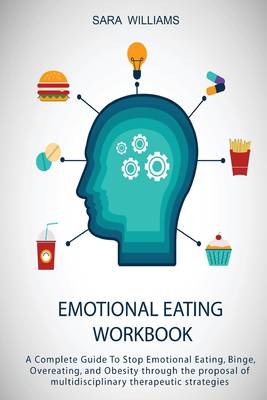
- Retrait gratuit dans votre magasin Club
- 7.000.000 titres dans notre catalogue
- Payer en toute sécurité
- Toujours un magasin près de chez vous
- Retrait gratuit dans votre magasin Club
- 7.000.000 titres dans notre catalogue
- Payer en toute sécurité
- Toujours un magasin près de chez vous
Emotional Eating Workbook
A Complete Guide To Stop Emotional Eating, Binge, Overeating, and Obesity through the proposal of multidisciplinary therapeutic strategies
Sara WilliamsDescription
Obesity is a complex disease, which requires an integrated, interdisciplinary approach. At the basis of this pathology, there is often the presence of dysfunctional eating behavior.
Data from the World Health Organization underline that 86% of deaths and 75% of health expenditure in Europe and the USA are caused by chronic diseases, which have as the lowest common denominator 4 main risk factors: smoking, alcohol abuse, poor diet, and physical inactivity.
Food represents a form of self-treatment to alleviate states of melancholy, sadness, anxiety, anger, impotence, insecurity, inadequacy, dissatisfaction.
In this book you will learn:
- - Correlations between food and emotions
- - Behavior behind emotional eating and binge
- - Causes of obesity and related complications
- - The importance of a multidisciplinary approach
- - The importance of physical activity
The improvement of eating behavior is fundamental for weight loss and for maintaining the results achieved. It should also not be forgotten the fundamental role played by physical activity in the overall psychological well-being. As evidenced by several studies, obesity is often related to low self-esteem and depressive symptoms, and the physical exercise correctly performed is associated with an improvement in the quality of life through multiple mechanisms including the release of endorphins and other neurotransmitters in the brain.
Spécifications
Parties prenantes
- Auteur(s) :
- Editeur:
Contenu
- Nombre de pages :
- 150
- Langue:
- Anglais
Caractéristiques
- EAN:
- 9781801133548
- Date de parution :
- 25-10-20
- Format:
- Livre broché
- Format numérique:
- Trade paperback (VS)
- Dimensions :
- 152 mm x 229 mm
- Poids :
- 208 g







